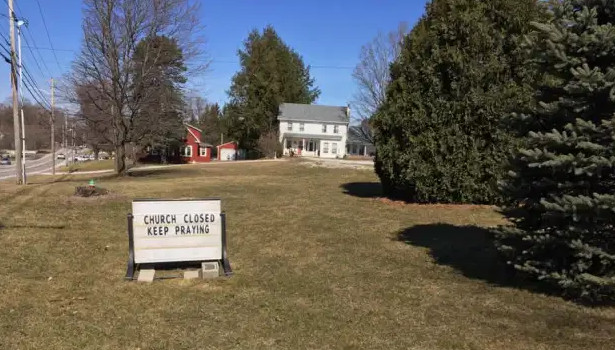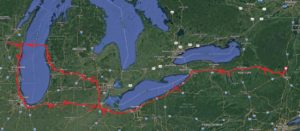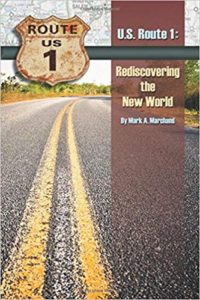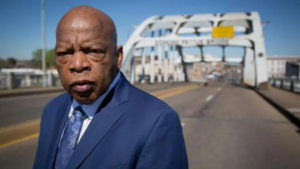“Church closed. Keep praying.”
The sign on the front lawn of the Pittsford Congregational Church UCC in Pittsford, Vermont said it all. As the pandemic expands, social distancing is a must, more gathering places are closed—but keep the faith. So few words, but so much meaning.
I glimpsed the sign driving north March 18 on U.S. Route 7 during a solo, mental-health sojourn through Vermont to the Canadian border and then south toward home through Upstate New York. I needed a change of scenery and succumbed to my persistent wanderlust to drive somewhere without any purpose or destination. And it was a beautiful day—in stark contrast to the turmoil surrounding us as we fight an invisible enemy.
When I spotted the sign driving past the church, I quickly found a place to turn around. I wanted a picture. I parked and another car pulled up behind me. A woman emerged. Congregation member Nicha McCuin walked up and greeted me warmly, while keeping a safe distance. I explained why I stopped. She was there for a different reason: Updating the sign to indicate the closing was because of the virus.
“I’m not sure I need to do that, though, because I think everyone knows by now all of these closings are because of the virus, right?” I agreed. We chatted for a few more minutes. She lamented the speed with which the world changed.
“Just a week ago we were making plans for future events. Now everything has changed so quickly. I don’t know when we’ll re-open.” We engaged in a mutual head shake. She walked to the church building. I took a few more pictures and sauntered back to my car.
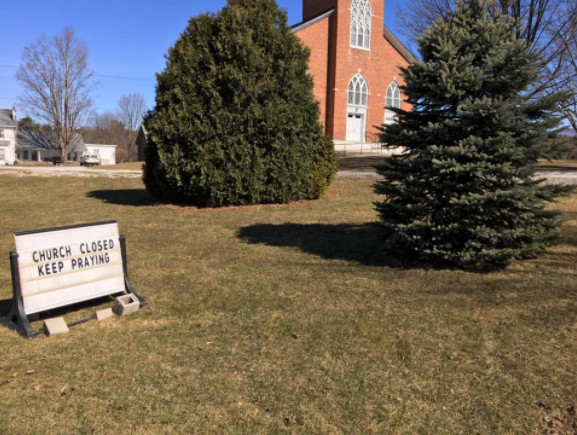
The front lawn of the Pittsford Congregational Church UCC in Pittsford Vermont
During my drive through rural Vermont I planned for little personal contact and expected panic, deserted streets, and xenophobia toward a car with plates from New York. We were now the state with the most COVID-19 infections. I was in for a surprise. For several miles before Pittsford, workers in lime-green vests walked both sides of the road picking up trash. I spotted a “Litter Patrol” sign. How bad could things be, I thought to myself, if workers were still picking up litter?
I stopped at a convenience store to use the restroom. I walked in prepared to buy candy bars and soda so I could be allowed restroom access. The clerk didn’t even look at me. I used the bathroom. I still bought a package of cupcakes and a Coke on my way out. The clerk smiled. I walked out in a daze. I began wondering: How long would this last before everyone was ordered to stay home? I sanitized my hands before resuming my drive.
***
Farther north, I stopped to stretch my legs in Burlington, Vermont’s largest city. It was a little grittier than I remembered. The waterfront along Lake Champlain—normally a popular gathering spot during nice weather—was nearly deserted. I pressed north. Nearing Canada, I angled west to cross several bridges across Champlain into Rouses Point, New York. I texted a photo to a friend, showing the sign for the border. He texted back, “Make a break for it.” I declined and stopped to eat my prepacked sandwich and to rest.
South along Route 9 and into Plattsburgh at the northern edge of the Adirondack Mountains I grew tired and lost patience with slow traffic. I headed to I-87 southbound and sped toward home in Saratoga County. During stops, I kept reading more bad news on my phone so I just wanted to be home.
It was on the interstate that the mildly good mood I acquired in Vermont disappeared. Fast. For over 50 miles on the major two-lane highway I didn’t see one other car. I only saw six tractor trailers. To my left, dozens of cars were heading north. I had read earlier that the U.S.-Canada border would close soon. I let my imagination get the best of me. Were those northbound drivers fleeing the country before the closure and the only other traffic allowed southbound was supply transport? My stomach was a mess. Finally, as I neared Lake George Village, more cars appeared but the feeling of uneasiness remained.
Some 40 miles north of home, Bruce Springsteen’s famous post-9/11 song “The Rising” poured from the radio. I screamed along with the words, hope surging through my veins as it did when I first heard the tune 18 years ago. And then the tears came. I cried for the situation we were in. I cried for our country. And I cried over the possibility of my wife and I not seeing our grown sons again soon. The episode lasted but a few minutes, but it allowed my bottled up, wildly gyrating emotions to escape.
I pressed on for home. We needed to make dinner plans.

